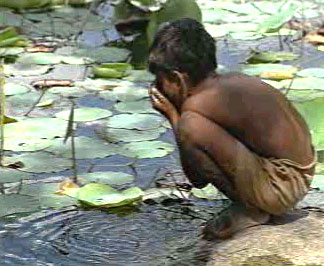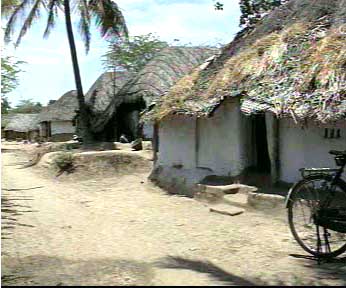

![]()
DANIDA -Danish International Development Agency
DANIDA - Danish International Development Agency (of the Royal Govt. of Denmark) - is engaged in rural development projects in many states in India. Of these one is based in Cuddalore in Tamilnadu, (the office was shifted from Madras to Cuddalore in 1994) that is engaged in water and sanitation projects in two districts.
 It may surprise many that
there are still many villages where people do not have even the basic sanitation
facility like the latrine. Danida was working in the villages from 1990 and at
the end of two years wanted to record the situation as it existed including to
change in the attitude of the people towards sanitation. the first documentary
'What is the need' was made.
It may surprise many that
there are still many villages where people do not have even the basic sanitation
facility like the latrine. Danida was working in the villages from 1990 and at
the end of two years wanted to record the situation as it existed including to
change in the attitude of the people towards sanitation. the first documentary
'What is the need' was made.
It is a 40 Mts. documentary
that dealt with the subject in detail and had interviews with the villagers. It
was structured in the style of BBC documentary rather than the flashy American
style. This film helped Danida to present a very clear picture of the situation
to planners in Denmark, for whom it is an enigma as to who and why will anyone say no to have a latrine.
villagers. It
was structured in the style of BBC documentary rather than the flashy American
style. This film helped Danida to present a very clear picture of the situation
to planners in Denmark, for whom it is an enigma as to who and why will anyone say no to have a latrine.
By 1992 video films have
become fairly popular even in villages where there is no latrine. Danida decided
to make the best use of this interest in video and chalked out a few  motivational
films. We were called in to do the films. The brief given to us made it clear
that the film should be very interesting and the people must get a feeling that
they are seeing a feature film and not a documentary, yet at the same time the
message must be conveyed in lucid terms. So we designed the motivational films
like short features and took care not to portray too much of the negative ideas
people have and refrained from being a film where the characters will talk down
to the others as if it is a lecture.
motivational
films. We were called in to do the films. The brief given to us made it clear
that the film should be very interesting and the people must get a feeling that
they are seeing a feature film and not a documentary, yet at the same time the
message must be conveyed in lucid terms. So we designed the motivational films
like short features and took care not to portray too much of the negative ideas
people have and refrained from being a film where the characters will talk down
to the others as if it is a lecture.
We made four films. They are : A new Life., Latrine - No Problem., Needed a latrine., Beautiful is our village., My Story and If I were a woman.
Theses films were accepted in full by the villagers at whom these were aimed, as is evident from the fact that the villagers agreed to have a latrine of their own. Even the people from neighboring villages approached Danida and asked for latrines in their village. Three of these films were dubbed in Kannada and screened in Karnataka, where too Danida had similar project. Even there the response was so good that they were able to fulfill the target very soon.
The films we made for Danida are
Documentaries : What is the
need ?
IRS & WS - Integrated Rural Sanitation and Water Supply Project.
Motivational films
A New Life
Needed a latrine
Latrine - No problem
Beautiful is our village
My Story
If I were a woman
In most pf these films we used some villagers to play some roles, which gave some authenticity to the films.
Presently Ramanathan is the Communication Consultant for Danida and is actively involved in all its communication projects.
A lady doctor is posted to a village and she finds it very uncomfortable to work there. She feels that unless the sanitary conditions are improved there is no way the villagers can be cured of the diseases they suffer from. But she does very little about it and plans to leave the village at the earliest. One of her teachers impresses upon her the need to teach the villagers on the need for hygiene. She decides to give it a try and succeeds in turning the children hygiene conscious. This has an effect on the elders also and soon under the guidance of the lady the villagers change their life style and become hygiene conscious. The lady is credited with the success and she decides to continue her stay in the village.
This
is a five minute film that explained the policy of DANIDA to help the villagers
to have a latrine  of their own. A boy from a village is married to a girl from a
small town, where she was used to a latrine. On her finding difficulties to
adjust to village life her mother in law decides to save money and ask the men
folk of the house to build a latrine. This film when shown to the people of the
village resulted in many of them opting for the latrine. This also prompted the
planners at Danida to go in for more such motivational films.
of their own. A boy from a village is married to a girl from a
small town, where she was used to a latrine. On her finding difficulties to
adjust to village life her mother in law decides to save money and ask the men
folk of the house to build a latrine. This film when shown to the people of the
village resulted in many of them opting for the latrine. This also prompted the
planners at Danida to go in for more such motivational films.
Latrine
- No Problem is a fairly long motivational film that tackles all kinds of
resistance and objections from the villagers t opt for a latrine. Set as a
comedy with a leading comedian of yester years the film succeeded in motivating
the people of the village where Danida scheme was being implemented as a pilot
project to come forward to opt for latrines. This also motivated people of other
villages to demand such facilities for them. In this film a lady doctor
willingly comes to work in the village answers all the quarries and
successfully convinces the villagers to opt for the latrine. The film also deals
with the maintenance of latrines and the advantages the people can expect from
double pit septic tanks.
years the film succeeded in motivating
the people of the village where Danida scheme was being implemented as a pilot
project to come forward to opt for latrines. This also motivated people of other
villages to demand such facilities for them. In this film a lady doctor
willingly comes to work in the village answers all the quarries and
successfully convinces the villagers to opt for the latrine. The film also deals
with the maintenance of latrines and the advantages the people can expect from
double pit septic tanks.
This is a five minute song and dance motivational quickie. Films and film songs are very popular with the villagers in India and particularly in Tamilnadu. This prompted us to use this technique for motivation.
 This
film is more about the functioning of a hand pump and also its maintenance to
get the full benefit out of it. We set the story as it is being
This
film is more about the functioning of a hand pump and also its maintenance to
get the full benefit out of it. We set the story as it is being told by the pump itself. We used a very simple technique of superimposing an
image of a girl on the pump and made it appear as if the pump has come to life
and talks. This appealed to the villagers very much.
told by the pump itself. We used a very simple technique of superimposing an
image of a girl on the pump and made it appear as if the pump has come to life
and talks. This appealed to the villagers very much.
Having done motivational films and achieved the desired success Danida thought it fit to do a film on gender equality. to awaken the need for this among the villagers particularly the men folk. For this we cast women in men's roles and men in women's roles. Though it was conceived of as a dream sequence we were able to spread the message successfully. All the roles were portrayed by the villagers themselves and they loved doing the film as much they liked the subject and understood the basic theme of the film. This film was widely appreciated not only by villagers but also by planers in world organisations like UNICEF and World Bank and Universities of London and Copenhagen.